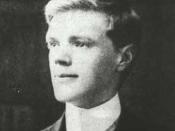In the short story "Odour of Chrysanthemums," D.H. Lawrence effectively and continually employs a technique of keeping certain entities absent from his story to convey their looming presence and definite importance. Lawrence's omission of Walter, a vastly crucial character, best demonstrates the author's ability and effectiveness in creating presence through absence. Through this method, Lawrence creates a sense of tension and anticipation within the reader's mind. Moreover, Lawrence plays with readers' expectations; he only offers the rather biased and extreme opinions in which the already established characters believe, in order to establish controversial, yet curious views about the absent entity. The reader must negotiate the gamut of opinions and statements set forth by existing characters in order to form an opinion of his/her own. Furthermore, the absence of such a seemingly essential being accentuates the focus around the situation and the central theme as opposed to just around its mere players.
Lawrence strategically omits Walter Bates, around whom the protagonist's epiphany chiefly revolves. His voice and mind are never present in the story and his body only appears at the end as seen through the eyes of his mother and Elizabeth, his wife. Walter's absence exerts a strong influence on his wife and children. In section I of the story, the family awaits Walter's return from the mines--and yet his presence seems to haunt the family. The very first entrance and statement by Annie, his daughter, regard the whereabouts of her father: "'Why mother, it's hardly a bit dark yet. The lamp's not lighted, and my father's not home[...]I've never seen him. Why? Has he come up an' gone past to Old Brinsley? He hasn't, mother, 'cos I never saw him'" (877-878). This grows further into a heated discourse between mother and child. Elizabeth thinks of him in frustration...
![Walter Winans [with Mt. Sheep head trophies] (LOC)](https://s.writework.com/uploads/17/172295/walter-winans-mt-sheep-head-trophies-loc-thumb.jpg)

